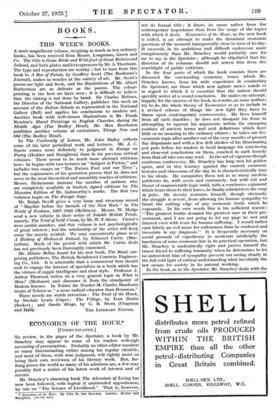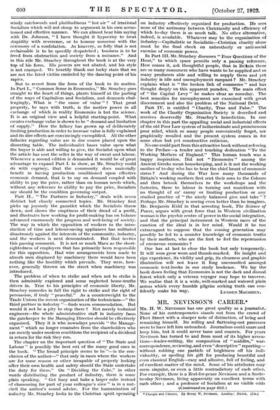ECONOMICS OF THE HOUR.*
[COMMUNICATED.]
To review, in the pages of the Spectator, a book by Mr. Strachey may appear to some of his readers well-nigh savouring of presumption. Probably no other editor numbers so many discriminating critics among his regular clientele, and most of them, with wise judgment, will rightly insist on being their own reviewers of his literary work. But, far- flung across the world as many of his admirers are, a few may possibly find a notice of his latest work of interest and of service.
Mr. Strachey's charming book The Adventure of Living has now been followed, with logical if unintended appositeness, by one on " The Science of Livelihood." That is, however,
• Economics of the Hour. By John St. Loe Strachey. London: Holder and Stoughton. 17e. ed. net.1
not its formal title ; it draws its name rather from the contemporary importance than from the scope of the topics with which it deals. Economics of the Hour, as the new book is called, is an attempt to make the dominant economic questions of the moment transparently clear to men of to-day.
It succeeds in its ambitious and difficult endeavour more conspicuously than Mr. Strachey would probably care for me to say in the Spectator ; although he stipulated that his direction of its columns should not screen him from the searchlight of public criticism.
In the four parts of which the book consists there are discussed the outstanding economic issues which Mr.
Strachey knows, from his wide experience in conducting the Spectator, are those which now agitate men's minds or in regard to which it is essential that the nation should speedily arrive at a sound conclusion. He makes no attempt, happily for the success of the book, to rewrite, as some authors try to do, the whole theory of Economics so as to include in a revised scheme of things the new light they have to throw upon contemporary controversies. He frees himself from all such shackles ; he does not dissipate his force in attempting to squeeze his arguments within the cramping confines of ancient terms and arid definitions which have little or no meaning to the ordinary citizen ; he takes one live economic topic after another out of the very mouths of present day disputants and with a few deft strokes of his illuminating pen puts before his readers in lucid language his convincing and clear-cut conclusions on them, couched in such homely form that all who run may read. In the art of vigorous though courteous controversy, Mr. Strachey has long won his golden spurs, and in this tourney against the current economic heresies and obsessions of the day he is characteristically true to his ideals. He vanquishes them not as so many modern publicists do, with scorn and contumely, but with cut and thrust of unanswerable logic until, with a conclusive argument which beats them to their knees, he finally administers the coup de grace. He sternly restrains himself, though obviously the struggle is severe, from allowing his human sympathy to blunt the cutting edge of any economic truth which he expounds. In his own words this is his sufficient reason : " The greatest truths demand the greatest care in their pre- sentment, and I am not going to let my page be wet and blurred even with tears for human suffering. I would rather earn falsely an evil name for callousness than be confused and irresolute in my diagnosis." It is frequently necessary on social grounds of expediency to moderate artificially the harshness of some economic law in its practical operation, but Mr. Strachey is undoubtedly right and proves himself the truest friend to suffering humanity when he determines to let no antecedent bias of sympathy prevent our seeing clearly in the full cold light of critical understanding what inevitably the law means for society in its natural working.
In the book, as in the Spectator, Mr. Strachey deals with the
'windy catchwords and platitudinous " hot air " of irrational Socialism which will not stoop to argument in his own accus- tomed and effective manner. We can almost hear him saying with Dr. Johnson, " I have thought it hypocrisy to treat stupidity with reverence, or to honour nonsense with the ceremony of a confutation. As knavery, so folly that is not reclaimable is to be speedily despatched ; business is to be freed from obstruction and society from a nuisance." And in this role Mr. Strachey throughout the book is at the very top of his form. His powers are not abated, and his style is not cramped. We heartily thank our lucky stars that we are not the fated victim encircled by the dancing point of his rapier.
But to revert from the form of the book to its matter. In Part I., " Common Sense in Economics," Mr. Strachey goes straight to the heart of things, plants himself at the parting of the ways of Capitalism and Socialism, and demands chal- lengingly, What is " the cause of value " ? That great property, he says with truth, is the motive power in all exchange of which in reality Economics is but the science. It is an original view and a helpful starting-point. What creates exchange value is shown to be " demand and limitation of supply." How the fallacy has grown up of deliberately limiting production in order to increase value is fully explained and its dire effects are convincingly exemplified. All the other fallacies regarding value are in due course placed upon the dissecting table. The individualist bases value upon what the buyer is able and willing to give, the Socialist upon what the article has cost the seller in the way of sweat and labour. Whenever a second edition is demanded it would be of great advantage to expand Part I. to show, as Mr. Strachey could do with cogency, that the community does materially benefit in having production conditioned upon effective economic demand, that is to say on demand coupled with ability to pay the price, rather than on human needs which, without any reference to ability to pay the price, Socialists say should be the condition governing output.
Part II., " The Partners in Industry," deals with seven distinct but closely connected topics. Mr. Strachey first picks up joyously the gauntlet which the Socialists throw down, and shows the emptiness of their dread of a profit, and illustrates how working for profit-making has on balance advanced enormously the progress and well-being of society. The way in which the opposition of workers to the intro- duction of time and labour-saving appliances has militated disastrously against the interests of the community, industry, and the workers is next demonstrated. But that invites this passing comment. It is not so much Marx as the short- sightedness of employers that has primarily been responsible for this opposition. Had wise arrangements been made to absorb men displaced by machinery there would have been nothing like the hostility which prevails. They were, how- ever, generally thrown on the street when machinery was introduced.
The problem of when to strike and when not to strike is then admirably explored and some neglected home-truths driven in. True to his principles of economic liberty, Mr. Strachey concedes in full the right to strike and the right of persuasion, if truly " peaceful." As a counterweight to the Trade Unions the recent organization of the technicians—" the third partner in industry "—finds warm commendation. But would it not be a pity to stop there ? Not merely technical engineers—the whole administrative staff in industry from the gatekeeper to the Managing Director should be effectively organized. They it is who nowadays provide " the Manage- ment " which no longer emanates from the shareholders who are merely under modem conditions the recipient of a dividend in return for the risk they run.
The chapter on the important question of " The State and Labour " is possibly the best out of the many good ones in the book. " The broad principle seems to be "—is the con- clusion of the author—" that only in cases where the workers are for some reason or other incapable of properly looking after their own health and safety should the State undertake the duty for them." On " Dividing the Cake," in other words distributing the product of industry, there is some plain speaking. " Get busy and bake a larger cake instead of clamouring for part of your colleague's slice " is in a nut- shell the author's sound advice. For the humanization of industry Mr. Strachey looks to the Christian spirit operating on industry effectively organized for production. He sees none of the antinomy between Christianity and efficiency of which to-day there is so much talk. No other alternative, indeed, is available. Whatever may be the organization of industry—Capitalistic or Socialistic—Christian charity alone must be the final check on unbrotherly or anti-social exercise of economic power.
In Part III. Mr. Strachey discusses " Four Questions of the Hour," to which space permits only a passing reference. How comes it, ask thoughtful people, that in Britain there are so many consumers who have wants to• be supplied and so many producers able and willing to supply them and yet industry is idle and unemployment rampant ? Mr. Strachey explains what is " the broken link of commerce " and has thought deeply on this apparent paradox.' The main effect of " the Capital Levy " he makes clear as noonday. The best remedies for unemployment are examined with great discernment and also the problem of the National Debt.
Part IV. is entitled " Charity, True and False." The work of the Charity Organization Society is described and receives deservedly Mr. Strachey's benediction. In one chapter in this part the appalling social and industrial effects of the old Poor Law system of indiscriminate and promiscuous poor relief, which so many people conveniently forget, are graphically recalled and the present system comes in fox some close but yet constructive criticism.
No one could part from this attractive book without referring to the Preface—a tender and touching dedication " To the Working Mothers of England." This human touch was a happy inspiration. Did not " Economics " among the Ancient Greeks mean housekeeping, and is it not the working mother of to-day who has to bear the chief brunt of economic stress ? And during the War how many thousands of Britain's working mothers first sent their sons to the Colours and then betook themselves to the workshops and the factories, there to labour in turning out munitions with no thought of ea' canny or limiting production or any studied practice of " the nicely balanced give and take " ? Perhaps Mr. Strachey is sowing even better than he imagines. Mr. Benjamin Kidd in that arresting book, The Science of Power, argues with great force that in Western civilization woman is the psychic centre of power in the social integration, and that the principal instrument in Western races of the emotion of the ideal is in her mind. Would it be too extravagant to suppose that the coming generation may possibly be led to a sounder knowledge of economic truths by their mothers, who are the first to feel the repercussion of erroneous economics ?
One has at last to close the book but only temporarily. It will soon grow worn and thumb-marked. Its insight and ripe experience, its virility and grip, its clearness and graphic illustration will not leave it Tong unconsulted amongst economic text-books in our study bookcase. We lay the' book down feeling that Economics is not the dark and dismal forest which only a veteran voyager may hope to traverse. We realize that it is a wide, well-marked and watered plain across which every humble pilgrim seeking truth can con-















































 Previous page
Previous page